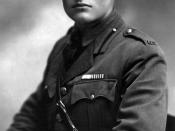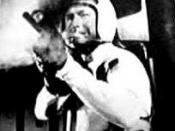In 'The light of the world' written by Ernest Hemingway
Steve Ketchel, a boxer
symbolizes a Jesus figure for a woman called Alice. Alice, a 350
pound, unpleasant prostitute struggles with her current life. Her
central being focuses at the belief that she had a sexual
relationship with Steve Ketchel. This wishful illusion arises
from a complex she has because of her ugly and unpleasant
appearance. Nick Adams, the main Hemingway character, believes
that Alice, although she has really given up her life, still has
the chance to change and live a happy life. Steven K. Hoffman
would call this belief Alice has 'nada'.
Nada is a term used in Hemingways story 'A clean well
lighted place'. Steven K. Hoffman interpreted the word in an
Essay he wrote. The word nada translated to English, basically
means 'nothing'. But further it means much more than the simple
word nothing.
Nada from the point of Alice's view means that there is nothing
behind of her belief.
That means that her life is not based on a
concrete belief. She does not believe in any religion; her
religion is Ketchel. That arises from her place in society. In
society she is ranked very low. A prostitute has nothing to say
in our society. And since she is that low she cant set her goals
higher. Her goals could be the goals Jesus talks about. Her goal
in life was and still is to sleep with more and more guys. Back
to nada it means that she has nothing; nothing to believe in and
nothing to live for.
Alice lives in an illusion. It seems that she suppresses the
fact that she is a fat prostitute. How much lower can you get?
She suppresses her problems with her dreams and illusions. The
most important belief is that she had a sexual relationship with
Ketchel. That is her main belief. For a normal American, Jesus
would the most important belief. Ketchel gives her the strength
to withstand her complexes. Ketchel in other words symbolizes
Jesus. That is of course very sad. When comparing Jesus with
Ketchel, you will not find any connecting. Ketchel is just a
popular boxer among her friends and she knows nothing more of
him. For her Ketchel is more than just a man to have sex with. As
said, for her Ketchel is Jesus. 'There was never a man like
that.', said Alice.
Alice did not succeed in her life. Not that it is over, but
till now she did not make herself happy. She is unhappy, she is a
prostitute and the most important; she has no belief. Her belief
is as stated above Ketchel. As it seems she does not want to
change. 'Leave me with my memories ... With my true, wonderful
memories.' Notice how she insist that her memories are true. She
is living a lie.
The only person who seems to see Alice in a different way is
Nick Adams. Nick Adams is found in most of the Hemingway stories.
What I conclude then is that Nick represents Hemingway in each
story. Further this could mean that Hemingway himself found that
a person like Alice still has the potential to change. Nick saw
Alice as a nice person of her own. Not like the others see her.
They see her as a fat whore. They don't see the good sides, but
stop looking when they see her appearance. Nick on the other hand
sees Alice as a attractive girl, not in the sense of having sex.
That is probably what Alice wanted from Steve. She wants somebody
who respects her. Ketchel is a illusion, but Nick is not. He is
real and could be a real memory. This way she could change and
therefor change her belief.
In conclusion I see that Hemingway offers a solution to
Alice. Nick Adams is the embodiment of Hemingway. If Alice would
join a real Ketchel, such as Nick she would rehabilitate and
become a happy human being. Then she could believe in something
more intelligent, such as the real Jesus figure. Since a boxer is
not the kind of person to take as a belief.


